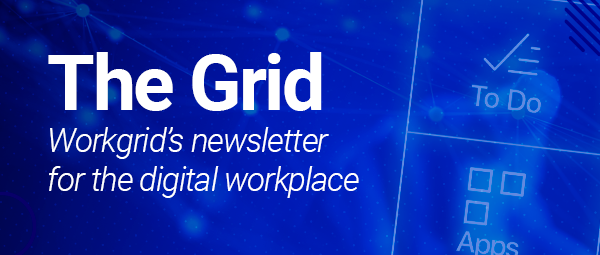The Next Leap in Intelligently Augmenting Work
Imagine arriving at work on a typical Monday morning. As you sip your coffee your AI Assistant, Workgrid, greets you with a summary of your day: a meeting at 10 AM, a project deadline at noon, and a reminder to approve your employee's expense report. It’s like having a personal assistant who knows your preferences, anticipates your needs, and seamlessly integrates with your enterprise applications.
Behind this remarkable efficiency lies a powerful technology: AI Agents. These intelligent entities are transforming how we interact with AI Assistants, bringing a new level of autonomy, proactivity, and scalability to traverse the digital workplace. But what exactly is an AI Agent, and how does it operate within the Workgrid AI Assistant? Let’s explore this cutting-edge technology and its profound impact on modern work environments.
Defining an AI Agent
An AI Agent is an advanced form of artificial intelligence designed to perform tasks autonomously, simulate human-like decision-making processes, and continuously learn from interactions. Unlike traditional AI systems that require explicit instructions for each task, AI Agents have the ability to operate independently, perform sensemaking, and are capable of handling complex scenarios with minimal human intervention.
Key Characteristics of AI Agents
Agentic AI often features these capabilities:
Autonomy: AI Agents can perform tasks without constant human oversight. They make decisions based on predefined (or unstructured) rules, algorithms, learning from past experiences and interactions.
Learning and Adaptation: Through machine learning, AI Agents improve their performance over time. They adapt to new information and changing environments, becoming more efficient and accurate with each interaction.
Proactivity: Rather than waiting for commands, AI Agents can anticipate user needs and take proactive actions. For example, an AI Agent might remind you of an upcoming meeting or suggest resources based on your current tasks.
Decision Making: The agent has the foresight based on unstructured reasoning what the next logical step may be, for example checking information available in other applications to inform a potential of responses or outcomes.
Iterative Interactivity: AI Agents can interact seamlessly with users and other systems to help determine the path to follow. They understand natural language, respond to queries, and can integrate with various enterprise applications to fetch or update information as they go about their tasks.
Context Awareness: By understanding the context in which they operate, AI Agents can provide more relevant and accurate assistance. This includes recognizing user preferences, work patterns, and organizational policies.
Bringing Agentic AI to your Workplace
It is not difficult to imagine a world in which you ask your personal assistant to review your calendar. But imagine a world in which your assistant was digital and you could simply type “If I have enough time off to take off the whole week of Memorial Day, please request it.”
This type of interaction requires several steps and decision making. The AI Assistant would need to find out when Memorial Day is, and if the employee has it allocated as a holiday. It would then need to determine how much time the employee individually has allocated to them in real time. Next, it would need to correctly identify the days to request and the system of record to use. Here we see decision and iterative reasoning happening automatically.
The response back to the employee might be something like:
“Good news, it looks like you have 80 hours available to you, so that’s plenty of time to take off the week of Memorial Day. Do you want to take off Tuesday to Friday or Tuesday to Monday?”
A simple response from the user would help close the loop and submit the request.
Real-World Applications of AI Agents and Assistants
AI Agents are transforming various departments within organizations:
HR: Automating onboarding processes, answering employee queries, and managing HR-related tasks.
IT: Assisting with troubleshooting, managing IT service requests, and providing real-time support.
Customer Support: Enhancing customer interactions by quickly resolving issues at the moment of contact or providing key information in the flow of an agents work.
The Future is Bright
AI Agents represent the future of AI Assistants, bringing a new level of intelligence, autonomy, and efficiency to the workplace. At Workgrid, we are empowering organizations to streamline operations and enhance productivity. As organizations continue to integrate AI into our daily workflows, the potential for innovation and growth is boundless.
To experience the benefits of Workgrid AI Assistant, schedule a demo or reach out to our team for more information.
Embrace the future of work with intelligent automation and proactive guided attention.




